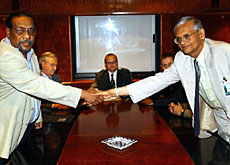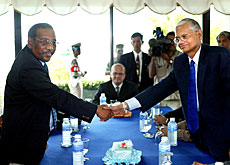Swiss federalism offers hope for Sri Lanka

Representatives of Sri Lanka's Tamil Tigers have been visiting Switzerland to study the country's federal system after a breakthrough in talks with the government.
On Monday, the Sri Lankan government formally agreed to share power with the separatist movement under a federal system.
The two sides announced their agreement last Thursday, after four days of peace talks in the Norwegian capital, Oslo.
The negotiations, which began early this year, are aimed at ending the almost 20-year-old separatist war on the island.
The Norwegians, who have been acting as mediators, said the two sides had agreed on “internal self-determination based on a federal model within a united Sri Lanka”.
The Tamil Tiger representatives, led by their chief negotiator Anton Balasingham, are visiting Switzerland, as well as several other countries with federal systems, including Canada, Australia, Germany and India.
Swiss foreign ministry spokesman, Manuel Sager, told swissinfo that discussions included ways in which “Switzerland could be of assistance in establishing a federal structure of government in Sri Lanka”.
Peace deal
The Swiss do not consider themselves to be competing as peace brokers with the Norwegians, who are considered the prime facilitators of the talks.
Switzerland has, however, been active for a long time in Sri Lanka on other fronts.
“For a number of years, we have focused some of our efforts on humanitarian assistance and mine clearing,” Sager told swissinfo.
“We [are now] examining how we could contribute our expertise towards establishing a federal state in Sri Lanka,” said Sager.
Swiss model
However, experts believe the Swiss system has much to offer a federal Sri Lanka.
“Switzerland is one of the very few federal systems that is based on a multicultural background,” said Thomas Fleiner, a professor at Fribourg University’s federalism institute.
“The Swiss constitution and the whole set-up of the legal system are strongly influenced by that.”
Sri Lanka’s cultural make-up includes Tamils and Singhalese, but also Muslim and Christian minorities.
According to Fleiner, Switzerland has learnt to cope with minority issues, not just at a federal level, but also at the cantonal level.
He believes that if federalism is to have any chance of succeeding in Sri Lanka, it will have to take account of the island’s cultural diversity.
No guarantee
But Fleiner fears there is little chance of a federal system being implemented in Sri Lanka.
“The idea of federalism is not particularly welcome in Sri Lanka today, because the country is based on the [British] system of government – a majority-based winner takes all system,” he said.
Fleiner’s remarks are echoed by Switzerland’s Tamil community, even though they too have hailed the latest agreement as a historical breakthrough.
“For the Tamils, the deal is perfectly acceptable for everybody,” said Anton Ponrajah, president of the Swiss Federation of Tamil Organisations.
“It will be more difficult for the government to get the backing of Singhalese politicians who have more to lose.”
New Sri Lanka
According to Fleiner, it is not realistic to expect the Swiss model to be a perfect fit for a new Sri Lanka. Rather it should be considered a type of federalism based on a specific philosophy.
“Swiss federalism, for example, considers compromise as an asset, a political value,” Fleiner told swissinfo.
“It also takes into account the voice of minorities when it comes to constitutional decisions or setting up the government.”
Ponrajah agrees that while the Swiss system has much to offer, transplanting it to Sri Lanka would not be of much benefit.
“Swiss federalism is the result of Switzerland’s own particular circumstances,” he told swissinfo.
“There are some elements that Sri Lanka could apply, but we need to find our own system.”
swissinfo, Scott Capper
Civil war has been raging in Sri Lanka for 19 years.
Over 60,000 people have died during the conflict.
The latest agreement between the Tamil Tigers and the Sri Lankan government calls for the creation of a new federal state.
Switzerland is home to more than 30,000 Tamils, who began arriving in the mid-Eighties.

In compliance with the JTI standards
More: SWI swissinfo.ch certified by the Journalism Trust Initiative











You can find an overview of ongoing debates with our journalists here . Please join us!
If you want to start a conversation about a topic raised in this article or want to report factual errors, email us at english@swissinfo.ch.